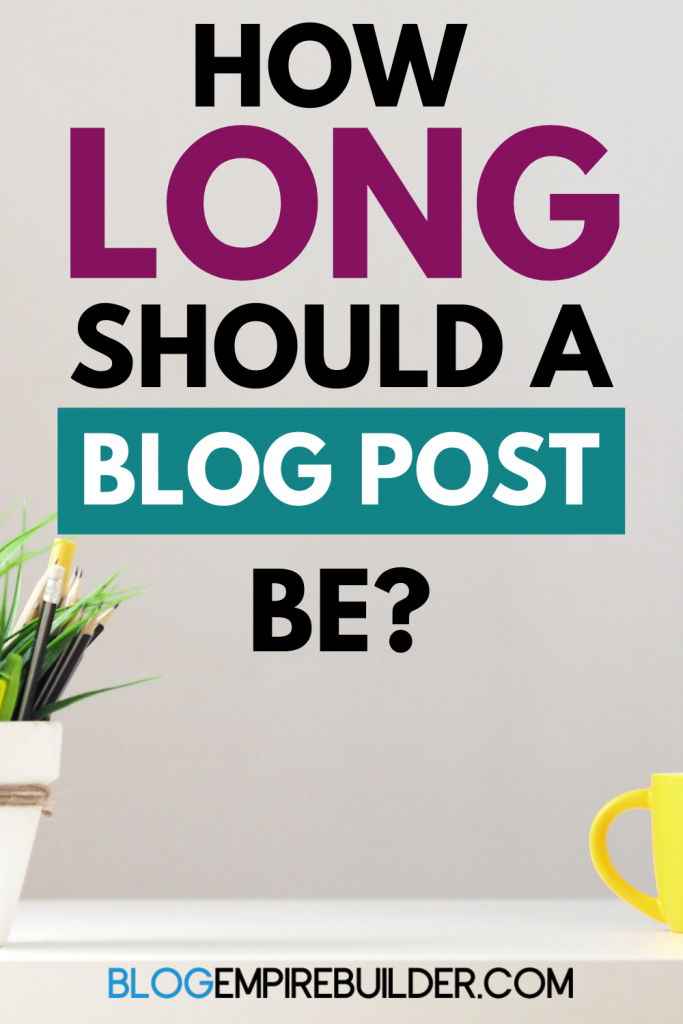We may earn money or products from the companies mentioned in this post.
How long should a blog post be? It's a topic that's been debated for years, but there's still no single, irrefutable right answer – and for good reason. The ideal blog post length will vary based on a number of factors, and what's right for one site or blog post won't be right for all of them.
That said, we can definitely help walk you through the important considerations so you can figure out how long YOUR blog posts should be.
Table of Contents
How Long Should a Blog Post Be? A Step-by-Step Guide to Figuring it Out
We've seen successful blog posts – successful meaning they accomplished what they set out to do – ranging from as little as 100 words to as much as 10,000 words. The overwhelming majority will fall somewhere between 500-3000 words. It all depends on your goals.
1| What's the point of your post?
Are you trying to write an in-depth tutorial or review? Are you putting out a quick update on something really time-sensitive? Is your blog more story-based?
Before you even START to think about what search engines will think of your post's length, think about the end user. If you're writing a quick post to let your readers know something's on sale for the next 24 hours, you don't need to write a 3000 word manifesto. On the other hand, if you're trying to walk someone through a fairly lengthy, complicated process, 300 words won't be enough to do your topic justice.
2 | What's your post's expected lifespan?
Different kinds of posts have different lifespans.
- Ultra-short – This is the kind of post that's irrelevant almost as soon as it's written. If you're making a last-minute post about an event this weekend, or a post about a 24-hour sale, that's going to fall under this category. A lot of these posts don't even get indexed before they're useless, so there's not a lot of point in worrying about what the search engines think of their length. Write what you need to write to get your point across.
- Mid-range – These are posts that will eventually be outdated without a lot of hope for reviving them. If you're writing an in-depth tutorial about a particular version of a piece of software, that will probably fall under this category. Eventually, people will slowly stop searching for the version you're referencing. Posts about limited-time museum exhibits, television show seasons, and most major events will fall under this category. They may be useful for a few months or even years in some cases, but you know there will come a time when people are no longer searching for your topic. These types of posts often have big search traffic while they last, so getting the post length right is more important than with ultra-short posts.
- Evergreen – These are the long-lived tortoises of the blogging world. While you might need to make occasional updates to keep these posts relevant, the underlying topics are not going anywhere anytime soon. This post about blog post length is a great example. Recipes and DIY projects are also great examples. We may need to update it now and then to keep it fresh, but it's unlikely people will stop searching for information about how long a blog post should be. New bloggers are always entering the field. These are the posts where length – and quality – is of the utmost importance.
3 | What traffic source(s) is your post aimed at?
Not every blog post is written with Google in mind. Sometimes, you do the keyword research and you realize nobody's searching for what you're writing. Now, sometimes that's because it's a brand new topic and the keyword tools just aren't showing the results yet – but if it's not a timely topic and there's no real search volume, Google becomes a less important part of the equation. You're not really trying to impress them.
Many sites get a lot of their traffic by writing tons of short posts geared towards social media or email followers. They don't MIND search engine traffic, but they're more concerned with pumping out lots of content without being slowed down by keyword research, adding filler, and optimizing everything. They're more interested in breaking news or getting shared by tons of people.
If you're in one of those situations, don't even worry about word count. Write the length and style that gets the job done. If your readers love you for your rambling stories, then write those. If they like your short, succinct snippets of news or funny anecdotes, stick with that.
On the other hand, if you're writing posts with search engines in mind, you'll want to continue on to the next part of this post…
We've decided we care about search traffic – how long should a blog post be for SEO purposes?
Again, the answer is:
It depends. Be very wary of anyone who tells you there's one ideal length.
Before we get into how long YOUR post should be, let's talk about the recommended upper and lower limits.
What's the shortest your blog post should be?

As a general rule, a post shorter than 300 words isn't likely to rank well (though the addition of video content can often boost a really short post). With a really short post, there's not a lot of content for search engines to “grab on to” to figure out the meaning and significance of your post. Also, most keywords just need more than 300 words to properly address the topic at hand.
Even at the 300-600 word range, it's still tough to be authoritative and offer the very best “answer” to a searcher's query – but for some topics, it's totally sufficient. It wasn't long ago that we blogged about a single 600-word blog post that earned well over $5000.
If you're dealing with a longer or more complicated topic, though, you may need to shoot for 1000+ words, or even 3000+ words in some cases.
What's the longest your blog post should be?
Knowing that longer posts are often better for SEO, there's a temptation to think that there's really no such thing as “too long” – but that's not true. If your post is too long, several things happen:
- You either water down the content or start saying the same things over and over
- People get bored or frustrated and hit the back button
- You start including too many loosely-related topics, making it harder for search engines to view your content as the best response to a more tightly focused query
None of these things are good. For some topics, 1500 words will be too much. For others, it might be as much as 8000 words.
It's worth noting, though, that there aren't a LOT of cases where you really need more than 5000 words. One great example would be a post on our British TV site: 360+ British TV Shows on Amazon Prime Video. At the time I'm writing this, the post is just over 8000 words. It ranks #1 for a lot of related searches, and it's a brilliant resource for someone who wants to find British TV shows they can watch for free with Prime Video. If we'd limited ourselves to 2000 or even 5000 words, it would have meant skipping descriptions or leaving out tons of shows – and then it wouldn't have been as good of a resource.
While it's pretty easy to say “most posts should be more than 300 words for best SEO results”, the upper limit is not nearly as well-defined. Rather than saying “never write a post over xxxx words”, I would advise you to focus on writing a great post and avoiding filler for the sake of making your post longer. 20,000 words is nearly always too much, but as soon as I say that, someone's going to point out an example of one time it worked. Don't get too hung up on the numbers, but be mindful of the need to make your post readable, useful, focused, and concise.
So you're saying the ideal blog post length is between 300 and 20,000 words? Can you be more specific?
Yes. Though the ideal length varies by topic, one of the easiest ways to get a sense of what might be a good length for your post is just to search your keyword(s) and see what's ranking well. If the majority of the posts in the top 5 or 10 results are all around 800 words, that tells you it doesn't take a 3000-word essay to rank well. On the other hand, if they're all in the 1500-2500 range, it's probably a good indicator that a 500-word post isn't going to cut it.
- Word Counter Plug plug-in for Chrome – This Chrome plug-in lets you select text, right-click, and instantly see how long it is.
Now, that's not to say you shouldn't experiment a bit if you truly feel the BEST possible post on the topic is either longer or shorter than the average result currently ranking well. It's just a guideline.
Is there a sort of all-purpose ideal blog post length?
Like we said before, this definitely varies by type of post. However, if you're looking for the closest thing to a “one size fits all” guideline, we'd recommend a length between 1200-2500 words. We've found that the majority of our successful evergreen posts fall within this range – both on our own blogs and the ones we've worked on with clients. It's also the most common length we see when we're checking out the length of competitors' blog posts.
Save it to Pinterest!


